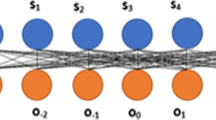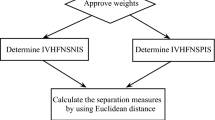Abstract
The purpose of this research study is to extend the multi-attribute group decision-making (MAGDM) methods to hesitant fuzzy soft set (HFS-set), hesitant fuzzy soft topology (HFS-topology) and HFS-Hausdorff spaces in group decision-making environment, as HFS-set is more superior tool to capture vagueness, hesitancy and incompleteness in individual evaluations. In order to obtain optimal decisions in MAGDM, we present two algorithms based on hesitant fuzzy soft set and hesitant fuzzy soft topology. Lastly, we present MAGDM method by using HFS-Hausdorff space to deal with hesitancy and uncertainty. The developed methods have the ability to solve MADGM problems in which the assessment information on available alternatives, provided by the experts, is presented by hesitant fuzzy soft sets. Furthermore, the efficiency of proposed algorithms is shown by applying them to the real-world problems. We use reduct, optimum reduct, aggregate HFS-sets and weight vector according of given alternatives, priority of the attributes and customer demand for best MAGDM in the selection of car.



Similar content being viewed by others
References
Abualigah LMQ (2019) Feature selection and enhanced Krill Herd algorithm for text document clustering. Stud Comput Intell Springer. https://doi.org/10.1007/978-3-030-10674-4
Abualigah LMQ, Hanandeh ES (2015) Applying genetic algorithms to information retrieval using vector space model. Int J Comput Sci Eng Appl 5(1):19–28
Abualigah LMQ, Khader AT (2017b) Unsupervised text feature selection technique based on hybrid particle swarm optimization algorithm with genetic operators for the text clustering. J Supercomput 73(11):4773–4795
Abualigah LMQ, Khader AT, Hanandeh ES (2017) A new feature selection method to improve the document clustering using particle swarm optimization algorithm. J Comput Sci 25:456–466
Abualigah LMQ, Khader AT, Hanandeh ES (2018) Hybrid clustering analysis using improved krill herd algorithm. Appl Intell 48(11):4047–4071
Abualigah LMQ, Khader AT, Hanandeh ES (2018b) A combination of objective functions and hybrid krill herd algorithm for text document clustering analysis. Eng Appl Artif Intell 73:111–125
Akram M, Habib A, Ilyas F, Dar JM (2018) Specific types of pythagorean fuzzy graphs and application to decision-making. Math Comput Appl 23:42
Akram M, Adeel A, Alcantud JCR (2019) Group decision-making methods based on hesitant N-soft sets. Expert Syst Appl 115:95–105
Ali MI (2011) A note on soft sets, rough soft sets and fuzzy soft sets. Appl Soft Comput 11:3329–3332
Ali MI, Feng F, Liu XY, Min WK, Shabir M (2009) On some new operations in soft set theory. Comput Math Appl 57:1547–1553
Amin F, Fahmi A, Abdullah S (2019) Dealer using a new trapezoidal cubic hesitant fuzzy TOPSIS method and application to group decision-making program. Soft Comput. https://doi.org/10.1007/s00500-018-3476-3
Aslam M, Fahmi A (2020) New work of trapezoidal cubic linguistic uncertain fuzzy Einstein hybrid weighted averaging operator and decision making. Soft Comput. https://doi.org/10.1007/s00500-019-04096-y
Atanassov KT (1986) Intuitionistic fuzzy sets. Fuzzy Sets Syst 20:87–96
Babitha KV, John SJ (2013) Hesitant fuzzy soft sets. J New Results Sci 3:98–107
Çağman N, Çitak F, Enginoglu S (2010) Fuzzy parameterized fuzzy soft set theory and its applications. Turk J Fuzzy Syst 1(1):21–35
Çağman N, Karataş S, Enginoglu S (2011a) Soft topology. Comput Math Appl 62:351–358
Çağman N, Enginoglu S, Çitak F (2011b) Fuzzy soft set theory and its applications. Iran J Fuzzy Syst 8(8):137–147
Çağman N, Çitak F, Enginoglu S (2011c) FP-soft set theory and its applications. Ann Fuzzy Math Inform 2(2):219–226
Fahmi A, Abdullah S, Amin F, Khan MSA (2019) Trapezoidal cubic fuzzy number Einstein hybrid weighted averaging operators and its application to decisionmaking. Soft Comput. https://doi.org/10.1007/s00500-018-3242-6
Feng F, Jun YB, Liu X, Li L (2010a) An adjustable approach to fuzzy soft set based decision making. J Comput Appl Math 234(1):10–20
Feng F, Li C, Davvaz B, Ali MI (2010b) Soft sets combined with fuzzy sets and rough sets, a tentative approach. Soft Comput 14(9):899–911
Garg H (2017) Generalized pythagorean fuzzy geometric aggregation operators using Einstein t-norm and t-conorm for multicriteria decision-making process. Int J Intell Syst 32(16):597–630
Garg H (2018) A new generalized Pythagorean fuzzy information aggregation using Einstein operations and its application to decision making. Int J Intell Syst 31(9):886–920
Garg H (2019) New logarithmic operational laws and their aggregation operators for Pythagorean fuzzy set and their applications. Int J Intell Syst 34(1):82–106
Hashmi MR, Riaz M (2020) A novel approach to censuses process by using pythagorean m-polar fuzzy Dombi’s aggregation operators. J Intell Fuzzy Syst 38(2):1977–1995
Hashmi MR, Riaz M, Smarandache F (2020) m-polar neutrosophic topology with applications to multi-criteria decision-making in medical diagnosis and clustering analysis. Int J Fuzzy Syst 22(1):273–292
Hazra H, Majumdar P, Samanta SK (2012) Soft topology, fuzzy information. Engineering 1:105–115. https://doi.org/10.1007/s12543-012-0104-2
Karaaslan F (2017) Correlation coefficients of single-valued neutrosophic refined soft sets and their applications in clustering analysis. Neural Comput Appl 28(9):2781–2793
Karaaslan F (2018) Multi-criteria decision making method based on similarity measures under single-valued neutrosophic refined and interval neutrosophic refined environments. Int J Intell Syst 33(5):928–952
Li Z, Cui R (2013) On the topological structure of intuitionistic fuzzy soft sets. Ann Fuzzy Math Inform 5(1):229–239
Maji PK, Biswas R, Roy AR (2001a) Fuzzy soft sets. J Fuzzy Math 9(3):589–602
Maji PK, Biswas R, Roy AR (2001b) Intuitionistic fuzzy soft sets. J Fuzzy Math 9(3):677–691
Maji PK, Biswas R, Roy AR (2003) Soft set theory. Comput Math Appl 45:555–562
Molodtsov D (1999) Soft set theory-first results. Comput Math Appl 37:19–31
Naeem K, Riaz M, Peng XD, Afzal D (2019a) Pythagorean fuzzy soft MCGDM methods based on TOPSIS, VIKOR and aggregation operators. J Intell Fuzzy Syst 37(5):6937–6957
Naeem K, Riaz M, Afzal D (2019b) Pythagorean m-polar fuzzy sets and TOPSIS method for the selection of advertisement mode. J Intell Fuzzy Syst 37(6):8441–8458
Osmanoglu I, Tokat D (2013) On intuitionistic fuzzy soft topology. Gen Math Notes 19(2):59–70
Pawlak Z (1982) Rough sets. Int J Inf Comput Sci 11:341–356
Pawlak Z, Skowron A (2007) Rough sets: some extensions. Inf Sci 177:28–40
Riaz M, Hashmi MR (2017) Fuzzy parameterized fuzzy soft topology with applications. Ann Fuzzy Math Inform 13(5):593–613
Riaz M, Hashmi MR (2019a) MAGDM for agribusiness in the environment of various cubic m-polar fuzzy averaging aggregation operators. J Intell Fuzzy Syst 37(3):3671–3691
Riaz M, Hashmi MR (2019b) Linear Diophantine fuzzy set and its applications towards multi-attribute decision making problems. J Intell Fuzzy Syst 37(4):5417–5439
Riaz M, Hashmi MR (2020) Soft rough pythagorean m-polar fuzzy sets and pythagorean m-polar fuzzy soft rough sets with application to decision-making. Comput Appl Math 39(1):1–36
Riaz M, Tehrim ST (2019a) Cubic bipolar fuzzy ordered weighted geometric aggregation operators and their application using internal and external cubic bipolar fuzzy data. Comput Appl Math 38(2):1–25
Riaz M, Tehrim ST (2019b) Multi-attribute group decision making based cubic bipolar fuzzy information using averaging aggregation operators. J Intell Fuzzy Syst 37(2):2473–2494
Riaz M, Tehrim ST (2019c) Bipolar fuzzy soft mappings with application to bipolar disorders. Int J Biomath 12(7):1–31
Roy S, Samanta TK (2014) A note on a soft topological space, Punjab University. J Math 46(1):19–24
Shabir M, Naz M (2011) On soft topological spaces. Comput Math Appl 61:1786–1799
Smarandache F (1998) Neutrosophy neutrosophic probability. Set and logic. American Research Press Rehoboth USA
Smarandache F (2004) Neutrosophic set—a generalization of the intuitionistic fuzzy set, Math. GM/0404520
Sreedevi A, Shankar NR (2016a) Key properties of hesitant fuzzy soft topological spaces. Int J Sci Eng Res 7(2):149–156
Sreedevi A, Shankar NR (2016b) Results on hesitant fuzzy soft topological spaces. Int J Adv Res 4(3):1–9
Tehrim ST, Riaz M (2019) A novel extension of TOPSIS to MCGDM with bipolar neutrosophic soft topology. J Intell Fuzzy Syst 37(4):5531–5549. https://doi.org/10.3233/JIFS-190668
Torra V (2010) Hesitant fuzzy sets. Int J Intell Syst 25:529–539
Torra V, Narukawa Y (2009) On hesitant fuzzy sets and decision. In: The 18th IEEE international conference on fuzzy systems, vol 25, Jeju Island, Korea, pp 1378–1382
Varol BP, Shostak A, Aygun H (2012) A new approach to soft topology. Hacet J Math Stat 41(5):731–741
Verma R, Sharma BD (2013) New operations over hesitant fuzzy sets. Fuzzy Inf Eng 2:129–146
Wang F, Li X, Chen X (2014) Hesitant fuzzy soft set and its applications in multicriteria decision making. J Appl Math. https://doi.org/10.1155/2014/643785
Yager RR (2014) Pythagorean membership grades in multi-criteria decision making. IEEE Trans Fuzzy Syst 22(4):958–965
Yager RR (2018) Multi-criteria decision making with interval criteria satisfactions using the golden rule representative value. IEEE Trans Fuzzy Syst 26(2):1023–1031
Yager RR, Abbasov AM (2013) Pythagorean membership grades, complex numbers, and decision making. Int J Intell Syst 28(5):436–452
Zadeh LA (1965) Fuzzy sets. Inf Control 8:338–356
Zhang XL, Xu ZS (2014) Extension of TOPSIS to multiple criteria decision making with pythagorean fuzzy sets. Int J Intell Syst 29:1061–1078
Zorlutuna I, Atmaca S (2016) Fuzzy parametrized fuzzy soft topology. New Trends Math Sci 4(1):142–152
Acknowledgements
We would like to thank the editor in chief, associate editor and anonymous reviewers for their insightful and constructive comments and suggestions that have been helpful for providing a better version of the present work.
Author information
Authors and Affiliations
Corresponding author
Ethics declarations
Conflict of interest
The authors declare that they have no conflict of interest.
Ethical approval
This article does not contain any studies with human participants or animals performed by any of the authors.
Additional information
Communicated by V. Loia.
Publisher's Note
Springer Nature remains neutral with regard to jurisdictional claims in published maps and institutional affiliations.
Rights and permissions
About this article
Cite this article
Riaz, M., Davvaz, B., Fakhar, A. et al. Hesitant fuzzy soft topology and its applications to multi-attribute group decision-making. Soft Comput 24, 16269–16289 (2020). https://doi.org/10.1007/s00500-020-04938-0
Published:
Issue Date:
DOI: https://doi.org/10.1007/s00500-020-04938-0




